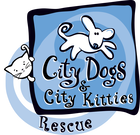You’ve just added a new City Dog to your family…now what? We’ve put together a list of perfectly normal, but sometimes troubling, behaviors and situations that often occur when you bring a new dog home—and some remedies and solutions we’ve found helpful. This is by no means an exhaustive list. Please contact us if you have questions or concerns.
- Count on some accidents during the first few days, even if your pup was previously housetrained. Dogs often get nervous in the transition and will have accidents or attempt to mark—especially males. Have pet-specific cleaning products on hand like Nature’s Miracle, be patient and start a refresher course on housetraining.
- Your dog may experience some diarrhea due to the stress of moving to a new home. Try having your dog fast for 12 hours, then feed him/her rice and boiled chicken and/or adding a tablespoon of plain canned pumpkin to her food to help ease tummy troubles. If it persists more than 48 hours, contact your vet. If there is blood in the stool, contact your vet immediately.
- Alternatively, your dog may not go to the bathroom at all for the first day due to the stress of a new environment. If this persists more than 48 hours, contact your vet.
- Introduce your new dog to your existing dogs in a neutral territory, such as a park, a parking lot, etc. Begin by walking them side by side rather then letting them get in each other’s faces. Be patient; it may take a few months, depending on individual personalities, for the dogs to work out a new pack order and become comfortable with each other.
- Introduce your new dog to your cats SLOWLY! Be sure you’re there to make the first introduction in person, and plan on supervising the subsequent get-togethers for at least the first week. Firmly, but gently, tell your dog “no” at the first signs of chasing or intimidating the cat. You may need to reinforce this for at least a few weeks. Have separate feeding areas, preferably out of sight and out of reach of each other – and expect your cat to be depressed or just not herself for a few weeks. This is normal; allow time for them to adjust to one another.
- Your new dog will look to you for benevolent leadership. Try to establish the “pack” order. Spend as much time as possible with your dog during the first few days. Be consistent in your routine.
- Keep a close eye on your dog to make sure she can’t slip away from you. Most new dogs will not come when called. Be careful not to let the dog run out of an open door, pull the leash out of your hand or get out of a fenced yard. If there is a hole in the fence, he/she will find it!
- We strongly recommend the use of a harness for walks instead of connecting the leash to a collar. New dogs have not yet established that they are a part of your family and may try to run away during the first few weeks as a new family member. Harnesses are more difficult to escape from and can also help with pulling.
- Keep your dog on leash whenever you are outside your home. Be sure he/she is wearing a collar with an ID tag containing contact information at all times. You need to allow time for training and loyalty to develop before you can be assured he/she will come when called.
- When your dog is first settling in, he/she may experience shyness, anxiety, restlessness, excitement, crying or barking—new behaviors for this particular dog. Be patient. Give your dog time to acclimate to a new environment. Ask us for help!
- During the first month, new owners should schedule an initial visit with the veterinarian you would like to establish a relationship with. The veterinarian will establish a baseline for your dog’s health, identify any potential concerns and answer any detailed or general questions you have about your dog.
- Dog owners should license their dog with DC or respective state or county of residence. DC residents should have a separate license for use of city dog parks. Dog licenses are renewed with the Department of Health in June each year. Proof of current vaccinations is required.
- We strongly recommend that dogs not be tied outside of local businesses, as dogs can be stolen, harmed by people or other dogs – or they may cause harm to themselves. Know which shops are pet friendly and bring a friend, if necessary, to watch your dog.
